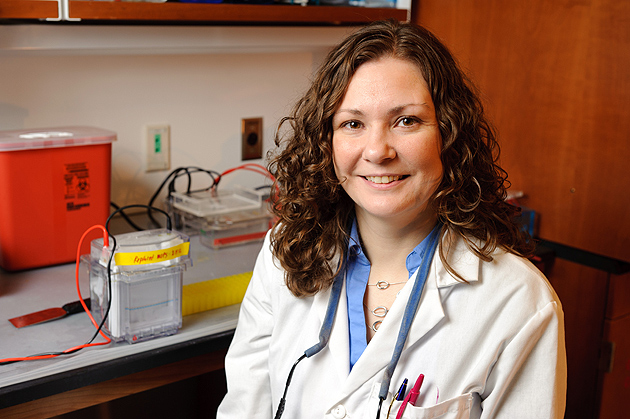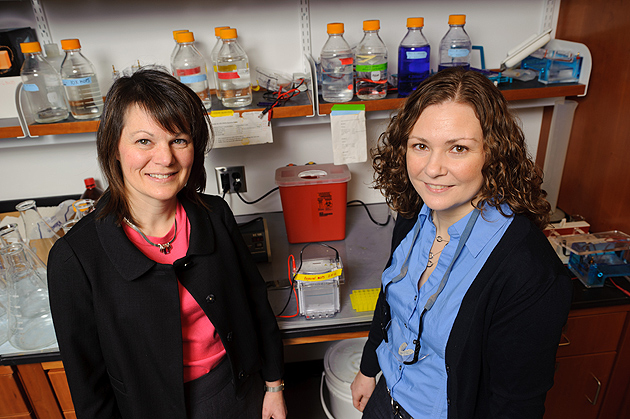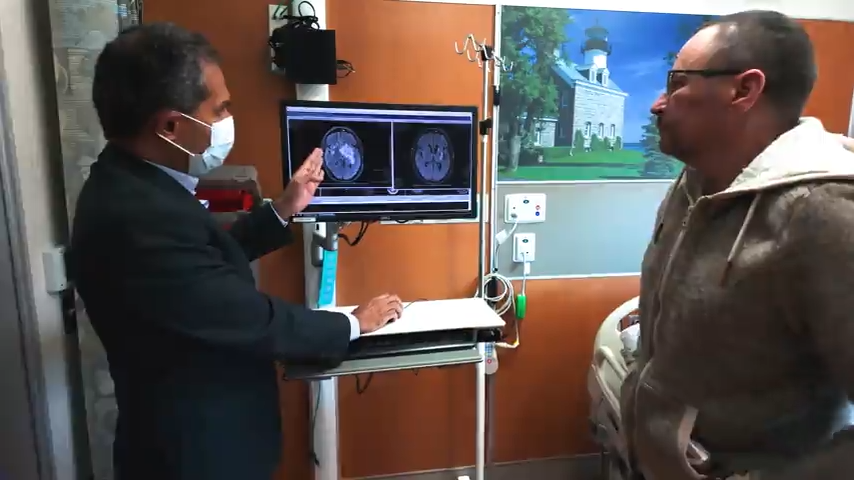
A University of Connecticut graduate student who is helping develop new drugs to fight potentially life-threatening infectious diseases has been nominated for a 2012 Women of Innovation Award by the Connecticut Technology Council.
Janet Paulsen, a doctoral candidate in the Department of Pharmaceutical Sciences, is a structural chemist working in the Anderson lab for medicinal chemistry in the School of Pharmacy. Coincidentally, the lab’s director, Amy Anderson, an associate professor of medicinal chemistry, is also nominated this year for a Women of Innovation Award.
The awards recognize women who demonstrate exceptional entrepreneurship, leadership, and innovation within science, technology, and engineering at the business, academic, research, and community level. UConn has seen nine award winners over the past five years.
Paulsen is nominated in the Collegian Innovation and Leadership category. Using a structure-based drug design approach, Paulsen is developing novel antifungal treatments for infectious diseases. Patients whose immune systems are compromised by chemotherapy, HIV, or leukemia cannot fight off fungal infections. Paulsen is working to find drugs to fight these systemic fungal infections by stopping the function of one of a disease’s essential proteins. This essential protein, called Dihydrofolate reductase (DHFR), can be found in all living things. The challenge is to attack the fungus’s DHFR without targeting the human DHFR.
Using x-ray crystallography and computational modeling, Paulsen can determine the structure of the DHFR protein, which she then uses to test antifungal compounds within that structure.
“What we want to do is design a small molecule that can be taken orally that will stop the function of that protein,” explains Paulsen. Another UConn researcher, Dennis Wright, associate professor of medicinal chemistry, will then make the compound in his lab for Paulsen to test.”
Paulsen’s research has already made considerable progress. “We have several compounds that can inhibit the function of DHFR at the enzymatic level,” she says.
The Women of Innovation nomination also recognizes Paulsen’s work as a 2011 summer intern for the prestigious Merck Internship Program, which has an acceptance rate of less than 1 percent of all applicants. She applied the skills she uses in the Anderson lab with a focus on developing a drug that can overcome the resistance produced by HIV integrase, which is HIV’s enzyme for inserting the DNA version of its genome into the host cell’s DNA.
“[Janet] does a lot of computational modeling, and then she does a lot of experimental work, and that is a rather rare combination,” Anderson says of Paulsen. “Usually people do one or the other but they don’t do both. She’s also a very poised and professional person, and she would be an excellent representative of us, both as a school and a program, and of women graduate students in general.”

Anderson, who was nominated in the category of Research Innovation and Leadership, was recognized for her work in innovative drug treatment for infectious diseases and drug resistance. Her focus is on combatting the bacterial infection named Methicillin-resistant Staphylococcus aureus, or MRSA, which is resistant to most antibiotic treatment. Anderson’s approach targets the metabolic function of one of the bacteria’s essential proteins.
Anderson is also being recognized for her work on drug resistance. Her lab has received several million dollars in grants to support its research.
Anderson’s nomination does not surprise Paulsen either. “[Amy] is a very good mentor. She is not only very knowledgeable of the work that we are doing, but she also cares about mentoring you,” Paulsen says. “She guides you from the point of an incoming graduate student to post-doctoral study.”
Developing new drugs can be an arduous and extremely challenging process, but Paulsen says she is not one to get easily discouraged.
“I think when you love doing something it is easier to keep motivated,” she says. “You have to keep in mind that what you are doing has the potential to affect a lot of people if it is successful. And that is kind of cool.”
Paulsen was nominated for the award by Board of Trustees Distinguished Professor Debra Kendall, head of the Department of Pharmaceutical Sciences.
“Janet is an extraordinary role model and graduate student who excels at computational and experimental work,” says Kendall. “She has built upon the skills obtained in her Ph.D. research and has creatively applied these as a Merck intern to the devastating health problems associated with HIV infection and AIDS world-wide. From my perspective as a teacher-scholar, this progression of learning as a student and then giving to the community-at-large through one’s scholarly pursuits is a triumph for us all.”
Paulsen and Anderson are among nine UConn finalists this year for Women of Innovation awards. Winners will be announced at the Connecticut Technology Council’s eighth annual banquet on March 1 in Southington.



